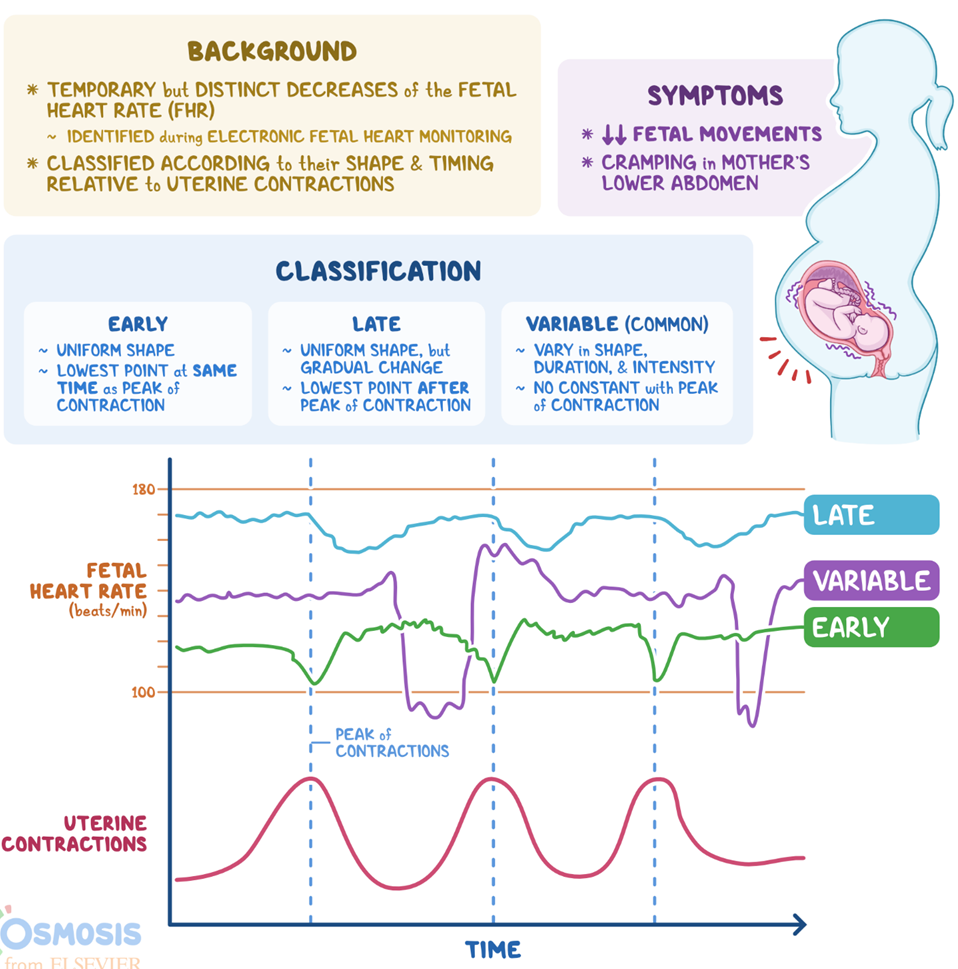A nurse is observing the electronic fetal heart rate monitor tracing for a client who is at 40 weeks of gestation and is in labor. The nurse should suspect a problem with the umbilical cord when she observes which of the following patterns?
Accelerations
Early decelerations
Late decelerations
Variable decelerations
The Correct Answer is D
The correct answer is D. Variable decelerations.
A. Accelerations in the fetal heart rate are generally considered reassuring. Accelerations are an indication of fetal well-being and are often seen in response to fetal movement.
B. Early decelerations are typically associated with head compression during contractions and are considered a normal response to the pressure on the fetal head.
C. Late decelerations are indicative of uteroplacental insufficiency.
Late decelerations occur after the peak of the contraction and are associated with inadequate oxygenation to the fetus. This pattern raises concerns about the baby's well-being.
D. Variable decelerations are associated with umbilical cord compression.
Variable decelerations are abrupt decreases in the fetal heart rate that vary in duration, depth, and timing. They often coincide with contractions and suggest compression or occlusion of the umbilical cord.

Nursing Test Bank
Naxlex Comprehensive Predictor Exams
Related Questions
Correct Answer is ["{"A":{"answers":"A"},"B":{"answers":"A"},"C":{"answers":"A"},"D":{"answers":"A"},"E":{"answers":"A"}}"]
Explanation
A. Apply oxygen at 10 L/min via venturi mask:
Anticipated: Applying oxygen is an appropriate action, especially during labor, to ensure adequate oxygenation for both the mother and the fetus.
B. Increase the oxytocin infusion to 13 mu/min:
Anticipated: Adjusting the oxytocin infusion rate may be considered based on the progress of labor and the response to the current infusion rate. This action is anticipated but should be done cautiously and in accordance with established protocols.
C. Initiate a bolus of primary IV fluids:
Anticipated: Initiating a bolus of primary IV fluids is appropriate, especially if there are signs of dehydration or if additional hydration is needed during labor.
D. Perform a sterile vaginal examination (SVE):
Anticipated: Performing a sterile vaginal examination is appropriate to assess cervical dilation, effacement, and station. This information helps in monitoring the progress of labor and making decisions about interventions.
E. Place the client in a side-lying position:
Anticipated: Placing the client in a side-lying position is an appropriate action. This position can enhance fetal oxygenation and blood flow, especially if there are concerns about fetal well-being.
Correct Answer is D
Explanation
The correct answer is D. Variable decelerations.
A. Accelerations in the fetal heart rate are generally considered reassuring. Accelerations are an indication of fetal well-being and are often seen in response to fetal movement.
B. Early decelerations are typically associated with head compression during contractions and are considered a normal response to the pressure on the fetal head.
C. Late decelerations are indicative of uteroplacental insufficiency.
Late decelerations occur after the peak of the contraction and are associated with inadequate oxygenation to the fetus. This pattern raises concerns about the baby's well-being.
D. Variable decelerations are associated with umbilical cord compression.
Variable decelerations are abrupt decreases in the fetal heart rate that vary in duration, depth, and timing. They often coincide with contractions and suggest compression or occlusion of the umbilical cord.

Whether you are a student looking to ace your exams or a practicing nurse seeking to enhance your expertise , our nursing education contents will empower you with the confidence and competence to make a difference in the lives of patients and become a respected leader in the healthcare field.
Visit Naxlex, invest in your future and unlock endless possibilities with our unparalleled nursing education contents today
Report Wrong Answer on the Current Question
Do you disagree with the answer? If yes, what is your expected answer? Explain.
Kindly be descriptive with the issue you are facing.
